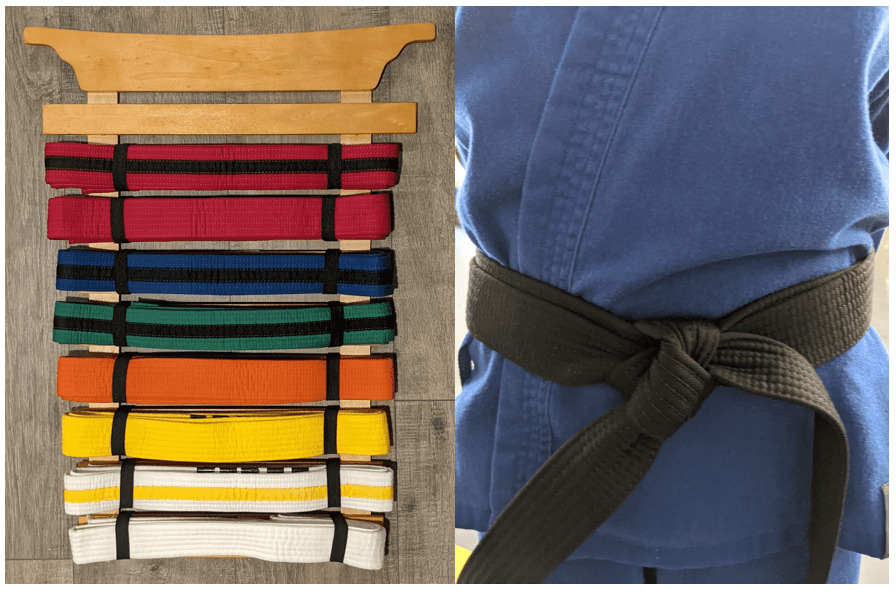Everything Is Kung Fu
“The earth and everything on it belong to the Lord.
Psalm 24:1 CEV
The world and its people belong to him.”

My youngest child received her black belt in tae kwon do yesterday. In honor of her achievement, I have chosen a martial arts theme for this week’s post, including a couple of clips from the 2010 movie The Karate Kid. This movie is actually about a boy learning kung fu, not karate. However, as I learned from a little online research, the term kung fu is pretty broad and is appropriate for our discussion:
“Kung fu, (Chinese [Wade-Giles romanization]: “skill” ) , Pinyin gongfu, a martial art, both a form of exercise with a spiritual dimension stemming from concentration and self-discipline and a primarily unarmed mode of personal combat often equated with karate or tae kwon do. The term kung fu can also signify careful preparation for the performance of any skillful endeavour without interference from the intellect or emotions.”
britannica.com
“In general, kung fu/kungfu (/ˌkʌŋˈfuː/ (listen) or /ˌkʊŋˈfuː/; 功夫, Pinyin: gōngfu) refers to the Chinese martial arts also called wushu and quanfa. In China, it refers to any study, learning, or practice that requires patience, energy, and time to complete. In its original meaning, kung fu can refer to any discipline or skill achieved through hard work and practice, not necessarily martial arts.”
wikipedia.org
Since kung fu can refer to any discipline or skill which requires careful preparation, hard work, and practice, I think it fits well to descibe our spiritual journey. As Christians, we are called to faith and obedience. But this can be hard, especially when we don’t understand how God is working. We often have our own ideas about how He should accomplish His will in our lives. But as the following clip illustrates, God’s way may be different than we expect:
Mr. Han: “Pick up your jacket…Hang it up…Take it down…Put it on…Take it off…”
The Karate Kid (2010)
Dre: “Can you just tell me why I’m doing this?”
Mr. Han knew that Dre had a habit of throwing his jacket on the floor and ignoring his mother when she asked him (repeatedly) to pick it up. Dre was discouraged after his first kung fu lesson because he thought he didn’t learn anything. But notice what he did when he got home . . . he hung up his jacket. One of the first lessons we all have to learn before we can be taught anything else is respect for our teachers. When my daughter first started tae kwon do as a very young child, she was taught to bow before stepping on the mat as a sign of respect. She was also taught to acknowledge any instructions she received with “Yes, sir!” or “Yes, ma’am!” These habits laid the foundation for the rest of her learning. The same is true for us. We must be in the habit of bowing before our Lord in reverence and respect when we enter His presence. This is the only way we will be teachable. And we must acknowledge and obey any instructions we receive, whether we understand them or not.
“‘For my thoughts are not your thoughts, neither are your ways my ways,’ declares the Lord.”
Isaiah 55:8 NIV

“We are not the cosmic center: God is. He holds the universe, and each of us, in His gravity. When we make ourselves the center of gravity, we attempt to hold God in orbit around us. Then we draw false conclusions. . . . The God of providence weaves millions of details into our lives and the lives around us. Maybe He doesn’t have one big reason for bringing a certain person, success, failure, disease, or accident into our lives; God may have hundreds of little reasons. In order to understand His explanations, we’d have to be God.”
Randy Alcorn, Seeing the Unseen
When we start thinking we understand things better than God does, we set ourselves up for failure. God can see our past, present, and future in one glance. He absolutely knows what’s best for us, and He knows the path we need to follow. He asks us to have faith and to trust Him to lead us. This is really scary sometimes. It’s hard to let go of what’s familiar and step out into the unknown. I struggle with this every day. Intellectually, I understand that God’s way and God’s timing are perfect, but I can’t always get my heart to agree. I still try to hang on to my way with one hand while trying to reach for God with the other. This never works. James describes this as being double-minded:
“But when you ask, you must believe and not doubt, because the one who doubts is like a wave of the sea, blown and tossed by the wind. That person should not expect to receive anything from the Lord. Such a person is double-minded and unstable in all they do.”
James 1:6-8 NIV
When I ask God to lead me, I must believe that He will do so perfectly. I must let go and reach for Him with both hands, ready to do whatever He tells me to do. Only in this way will I be able to live my best life. Only in this way will I have peace. Recently, I wrote several concerns in my Spirit journal, complaining to God that even though I was trying to do what He was telling me to do, I was still confused, anxious, and unhappy. Almost all of my subsequent devotionals and Scripture readings for that day had to do with humility and acknowledging who God is. Message received. I had forgotten the very first lesson. I had forgotten to bow before I stepped on the mat and respond “Yes, sir!” when given an instruction. I had neglected to show God the reverence and respect He deserves, and I was complaining about what I wanted instead of focusing on what He wants me to do. The instruction I wrote for myself in the margin became the title I gave that journal entry: “If you are not at peace, you have not fully surrendered to God.”
“Believe and not doubt. Those words are sobering, convicting, even a bit frightening. Because it’s so easy to doubt, isn’t it? . . . Are you double-minded — relying on the world and on your own resources to see you through — even as you turn to God in prayer? Or are you fully relying on Him to give you the answers you need? . . . That doesn’t mean that you never have any doubts about how or when God will answer; it is that you never doubt that God is the answer.”
The Weekly Faith Project

“Physical training is good, but training for godliness is much better, promising benefits in this life and in the life to come.”
1 Timothy 4:8 NLT
We are called to train for godliness. Like physical training, this takes hard work, and the journey is long. The picture above on the left above shows some of my daughter’s tae kwon do belts. We don’t have enough room to display all of them. The picture on the right was taken yesterday after her black belt ceremony. Her journey from white belt to black belt has taken several years, and the road hasn’t always been smooth. When she first moved up into the advanced class, it was hard for her . . . really hard. In fact, she quit completely for a couple of years. It was obvious that the work required to advance was more than she was ready to put in, so we didn’t force her to continue. This was her journey, and she had to decide if she was willing to do the work. That decision came later when she saw the demo team perform at a function held at our church. She saw what those kids were able to do, and she wanted to be able to do it, too. We signed her back up for lessons that week, and she has been working hard ever since, not because she is being forced to, but because she loves it and she finds great satisfaction in each achievement, large or small. Now she is ready to move on in her journey and to become a leader for other students on the same road.
John Ortberg talks about this idea, too. He compares our spiritual journey to a body-builder competition:
“Every year a few human beings approach their full physical potential of strength and conditioning; they show us what the body can become in body-builder competitions. They have devoted themselves to developing their bodies. Their habits of life — eating, exercise, rest, and so on — are arranged around a single task so that people can look at them and say, ‘So that’s what a human body can be. I had no idea!’ This kind of conditioning does not come about by accident. . . . Jesus confronted people directly about the choice to become a follower. He came with the gracious announcement that it is now possible to live in the presence and under the reign of God — that was his Good News. It is possible to live in such a way that when people see us, they will say to themselves, ‘Wow! I didn’t know that a life could look like that.’ It indeed happens. It has happened for many who have followed Christ, and it really is possible for us. . . . This is the race for which we were born. But we will not drift into such a life. We must decide.”
John Ortberg, The Life You’ve Always Wanted
We must decide. God will not force us. This is our journey, and we must be ready and willing to put in the work. Once we make that decision, we will work hard because we love it. We will find satisfaction in each new achievement. More than that, we will become an example to others. We will show them what the Christian life can look like. Then they will want that life, too. So what exactly do we need to do? We’ve already discussed the first lesson: enter God’s presence with respect and be ready to respond in obedience to His instructions. Make it a daily habit to bow before Him in prayer and obey what He tells us in His Word. Beyond that, we must let Him guide us however He chooses to. As John Ortberg discusses in his book The Life You’ve Always Wanted, there are spiritual disciplines that we can adopt to help us, such as solitude, servanthood, meditation on Scripture, and anything else that trains us for spiritual life. But ultimately, it’s the Holy Spirit who does the work. It is His job to transform us into the image of Christ. It is our job to be teachable and available.
“True obedience means doing what God says, when He says it, how He says it should be done, until what He says is accomplished — regardless of whether you understand the reasons for it or not. . . . God’s goal is to grow your trust in Him, so He will give you assignments that test your heart and mature your faith. The good news is that, when you submit to God, He shows you His faithfulness and empowers you by His Holy Spirit to do everything that He calls you to do. Your obedience — even though you don’t understand what He is doing — exercises your faith, making it stronger.”
Charles F. Stanley, 30 Life Principles
Even though we may not understand what God is doing, we can trust that what He is doing is for our good. When we obey Him, He strengthens us and blesses us in ways we never could have imagined . . .
Mr. Han: “Kung fu lives in everything we do, Xiao Dre. It lives in how we put on a jacket, how we take off the jacket. It lives in how we treat people. Everything is kung fu.”
The Karate Kid (2010)
Everything we do can be used in our spiritual training. God does not waste a single second. Neither should we. We are called to trust Him, obey Him, and do everything for His glory. When we do, we’ll be amazed at what He can accomplish through us! This week’s Scripture passages focus on spiritual training. There is a printer-friendly pdf version below the image. As we come to the Lord and ask Him to teach us, let’s remember the very first lesson: bow before Him and say, “Yes, sir!”

“Every athlete in training submits to strict discipline,
1 Corinthians 9:25 GNT
in order to be crowned with a wreath that will not last;
but we do it for one that will last forever.”

References:
- Alcorn, Randy. Seeing the Unseen, Expanded Edition: A 90-Day Devotional to Set Your Mind on Eternity. Multnomah, 2017.
- The Karate Kid. Dir. Harald Zwart. Sony Pictures, 2010.
- “The Karate Kid (2010) – Everything is Kung Fu Scene (4/10) | Movieclips.” YouTube, uploaded by Movieclips, 7 February 2017, https://youtu.be/G6f0w5BRasw.
- The Karate Kid (2010) – Pick Up Your Jacket Scene (2/10) | Movieclips.” YouTube, uploaded by Movieclips, 7 February 2017, https://youtu.be/8INjmc-WWSY.
- “Kung fu.” Encyclopedia Britannica, 24 October 2017, https://www.britannica.com/sports/kung-fu.
- “Kung fu (term).” Wikipedia, Wikimedia Foundation, 1 March 2021, https://en.wikipedia.org/wiki/Kung_fu_(term).
- Ortberg, John. The Life You’ve Always Wanted: Spiritual Disciplines for Ordinary People. Zondervan, 2002.
- Stanley, Charles F. 30 Life Principles Study Guide: A Study for Growing in Knowledge and Understanding of God. Thomas Nelson, 2008.
- The Weekly Faith Project: A Challenge to Journal, Reflect, and Cultivate a Genuine Faith. Zondervan, 2019.
Images:
- Kung Fu Kick Featured image by Gerd Altmann from Pixabay
- Man on Mountain image by mohamed Hassan from Pixabay
- Girl with Starry Sky image by Gerd Altmann from Pixabay
- Tae Kwon Do Belts image by me
- Girl at Sunset image by klimkin from Pixabay